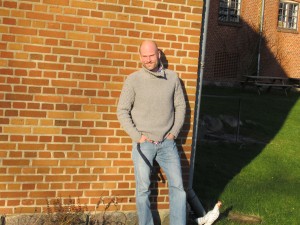
Ulrik in front of his workplace.
Ulrik, you’re an ethnographer?
Yes, that’s right. I got my degree in 2006, after nine years of studies. I’m currently the leader of The Ethnographic Collections at Moesgård Museum in the Århus area.
Did you make any fieldwork?
I was in Egypt, in Alexandria, where I made a project about some Greek, Italian and Armenian families. They are the remaining few of some large groups from the time before the Second World War.
Do you have a particular interest in minorities?
I wouldn’t say that. My fieldwork is about these people who are somehow living in the past. They have a dream of a past glory. I’m interested in the question: How does one recollect things? That was the theme of my speciale (master’s dissertation), which dealt with Palestinian refugees in Denmark…
So after Egypt you made a second fieldwork here in Denmark, right?
It was a kind of miniature fieldwork. While I was writing my dissertation, I interviewed local people with Palestinian roots. The interviews focused on their ”collective memory” of a Palestine where they’ve never been.
How do the Danish Palestinians deal with their past?
If you don’t feel at ease with the times you’re living in, you’ll be more inclined to cling yourself to something past, even if it’s a thought construction. For the persons whose grandparents were born in Palestine, it is a political question. They talk about wanting to have their country back. But that doesn’t mean they want to drop the reins here. It’s more about the right to be able to go back. They want others to recognize that their people have suffered injury – that they themselves are suffering. They might be unemployed. In many ways, they feel left out of the Danish society. Perhaps that’s why so many young third generation Danish Palestinians feel uncomfortable and are in conflict with the authorities.
How can we make them feel better?
It is evident that in order to function well, you have to be part of a community, on equal terms with other people. In Denmark the talk has been about integrating people – but in practice there has been a demand that people with a different religious or cultural background should be assimilated. I think the gap between the words said and the things actually done, has made us ”lose” a whole lot of people.
Are the Danes living in the past?
…read on tomorrow!





